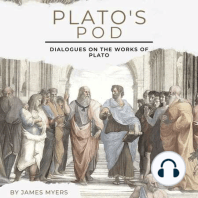120 min listen

Plato's Philebus, Part 3: The Philosopher's Arithmetic
Plato's Philebus, Part 3: The Philosopher's Arithmetic
ratings:
Length:
112 minutes
Released:
Feb 23, 2023
Format:
Podcast episode
Description
In our exercise of reason to judge the harmonious mixture of pleasure and knowledge in the good life, Socrates ranks first the skill of measurement. In the conclusion of Plato’s Philebus, we learn that measuring the combination of limits in becoming and the unlimitedness of being requires a special type of ability. On February 12, 2023, members of the Toronto, Calgary, and Chicago Philosophy Meetup groups met to consider the distinction that Socrates makes between the “Philosopher’s arithmetic” and the everyday mathematics taught in school. Acknowledging that limits in the present state of becoming are unknowable, the philosopher continuously divides combinations of things to find their unities. In a wide-ranging and fascinating discussion, we touched on the two key values of zero and one-half in the soul’s recollection of unity, and the possible application of the philosopher’s arithmetic in understanding quantum mechanics.
Released:
Feb 23, 2023
Format:
Podcast episode
Titles in the series (59)
Dialogue on The Phaedrus (Part II): The Purpose of Speech, and its Powers in Particular by Plato's Pod: Dialogues on the works of Plato